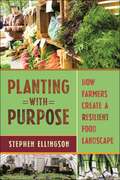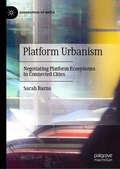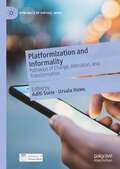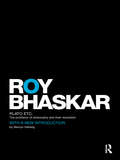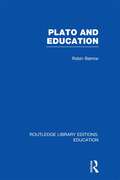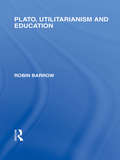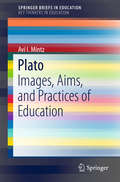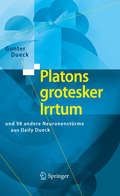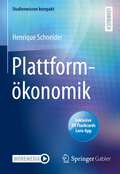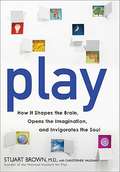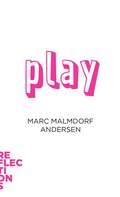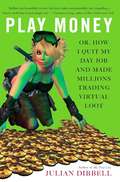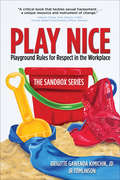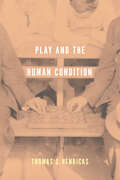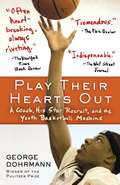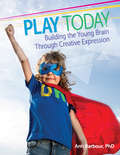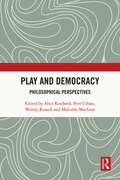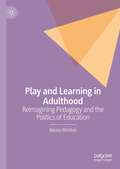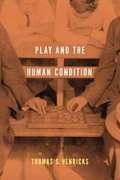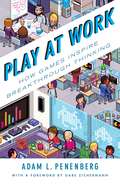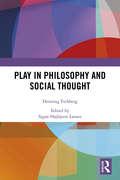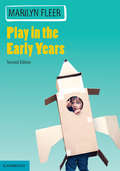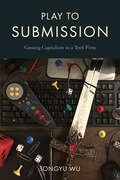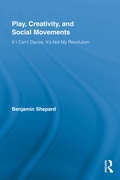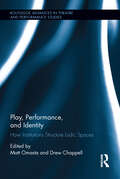- Table View
- List View
Planting With Purpose: How Farmers Create a Resilient Food Landscape
by Stephen EllingsonExamines local food movement activism in a period of increasing climate chaos and neoliberal crisis, economic inequalities and political divisionsIn the face of numerous challenges, small-scale farming for local markets requires enormous courage and optimism. The decision to become a farmer often arises from a profound desire to uphold certain values and beliefs, driven by the moral and emotional motivations to contribute to a greater good.Central New York’s local food market draws a unique cohort of individuals who see farming as more than just a livelihood; it is a way to define a good life and contribute to the well-being of the society they cherish. Their moral order revolves around shared beliefs in sustainability and stewardship of the land, emphasizing health and risk management, cooperation over competition, and a deep sense of justice. For these farmers, relationships and family ties are foundational to their work, creating a strong sense of community within the local food system.This book delves into the captivating world of local food markets in a “Rust Belt” region of the state, where 51 individuals representing 45 different farms, restaurants, agricultural non-profits, and local food retailers share their inspiring stories through conversations and interviews. Author Stephen Ellingson explores the intricate web of moral commitments, self-understandings, and emotional experiences that drive and sustain small-scale farming for the local food market. By amplifying the voices of these unsung heroes, it gives recognition to the crucial role they play in society and offers important insights into the values that underpin their contributions to the local food system.
Platform Urbanism: Negotiating Platform Ecosystems in Connected Cities (Geographies of Media)
by Sarah BarnsThis book reflects on what it means to live as urban citizens in a world increasingly shaped by the business and organisational logics of digital platforms. Where smart city strategies promote the roll-out of internet of things (IoT) technologies and big data analytics by city governments worldwide, platform urbanism responds to the deep and pervasive entanglements that exist between urban citizens, city services and platform ecosystems today. Recent years have witnessed a backlash against major global platforms, evidenced by burgeoning literatures on platform capitalism, the platform society, platform surveillance and platform governance, as well as regulatory attention towards the market power of platforms in their dominance of global data infrastructure. This book responds to these developments and asks: How do platform ecosystems reshape connected cities? How do urban researchers and policy makers respond to the logics of platform ecosystems and platform intermediation? What sorts of multisensory urban engagements are rendered through platform interfaces and modalities? And what sorts of governance challenges and responses are needed to cultivate and champion the digital public spaces of our connected lives.
Platformization and Informality: Pathways of Change, Alteration, and Transformation (Dynamics of Virtual Work)
by Ursula Huws Aditi SurieIn this edited volume, scholars from Mumbai, Bengaluru, Jakarta, Cape Town, Sao Paulo and other cities of the global South explore the complex relationship between platformization and informality through a different lens. Drawing on extensive theoretical, quantitative and qualitative scholarship, they provide both a useful overview and insights into the lived realities of gig work for platforms covering a range of skills, working conditions, and forms of algorithmic management. Platform work has attracted considerable attention from scholars in the global North, who have tended to view it as a form of casualisation of work that was previously regulated. But what about the global South, where most employment, especially that of women and migrant workers was historically already informal?Beyond a focus on livelihoods, employment, and work, the authors show how labour platforms take on powers that bring about broader impacts, including those affecting identity and personal wellbeing. They also illustrate the impact of platformization on the governance of affected sectors by public agencies, thus affecting political power, and how public data infrastructures contribute to further platformization. The purpose of this pioneering work is to lay bare these interactions to then rebuild our understanding of platformization and its social, political, cultural and economic impacts. Its insights are attentive to gender and ethnic differences, as well as geographical ones.
Plato Etc: Problems of Philosophy and their Resolution (Classical Texts in Critical Realism (Routledge Critical Realism))
by Roy BhaskarIn this concise text, Roy Bhaskar sets out to diagnose, explain and resolve the "problems of philosophy". Plato Etc. reviews all the main areas of the subject: the theory of knowledge and philosophy of science; the philosophy of logic and language; the philosophies of space, time and causality; the philosophy of the social and life sciences and of dialectic; ethics, politics and aesthetics; and the history and sociology of philosophy. Among the issues discussed are the problems of induction and universals, the question of relativism, Heidegger’s "scandal of philosophy" (the search for a proof of the reality of the external world), the nature of moral truth and the conundrum of free will and determinism. The last two chapters consist of a synoptic account of the development of Western philosophy from the pre-Socratics to poststructuralism. Plato Etc. seeks to revindicate the philosophical project, and to demonstrate that the author’s "dialectical critical realism" has the categorical power to remedy the problem fields of philosophy. The book serves both as a critical introduction to philosophy and as an invaluable resource for the scholar.
Plato and Education (Routledge Library Editions: Education)
by Robin BarrowThis introduction to Plato’s philosophical and educational thought examines Plato’s views and relates them to issues and questions that occupy philosophers of education. Robin Barrow stresses the relevance of Plato today, while introducing the student both to Plato’s philosophy and to contemporary educational debate. In the first part of the book the author examines Plato’s historical background and summarizes the Republic. Successive chapters are concerned with the critical discussion of specific educational issues. He deals with questions relating to the impartial distribution of education, taking as a starting point Plato’s celebrated dictum that unequals should be treated unequally. He examines certain methodological concepts such as ‘discovery-learning’ and ‘play’ and also raises the wider question of children’s freedom. He looks critically at the content of the curriculum and discusses Plato’s theory of knowledge and attitude to art. Finally Robin Barrow discusses Plato’s view of moral education and the related problem of what constitutes moral indoctrination
Plato, Utilitarianism and Education (International Library of the Philosophy of Education Volume 3)
by Robin BarrowThree lines of argument are central to this book: that Plato's views as expounded in the Republic indicate that he was a utilitarian; that utilitarianism is the only acceptable ethical theory; that these conclusions have significant repercussions for education. Throughout the book the exposition of utilitarianism and the interpretation of the Republic are closely linked. The author assesses the nature of recent Platonic criticism and provides a critical summary of the Republic. He expounds and defends utilitarianismn and examines in greater depth the consequences for education of accepting a utilitarian position, showing how, for example, from this standpoint such key terms in educational debate as 'autonomy' and 'self-development' must be reassessed as educational objectives.
Plato: Images, Aims, And Practices Of Education (SpringerBriefs in Education)
by Avi I. MintzThis book opens by providing the historical context of Plato’s engagement with education, including an overview of Plato’s life as student and educator. The author organizes his discussion of education in the Platonic Corpus around Plato’s images, both the familiar – the cave, the gadfly, the torpedo fish, and the midwife – and the less familiar – the intellectual aviary, the wax tablet, and the kindled fire. These educational images reveal that, for Plato, philosophizing is inextricably linked to learning; that is, philosophy is fundamentally an educational endeavor. The book concludes by exploring Plato’s legacy in education, discussing the use of the “Socratic method” in schools and the Academy’s foundational place in the history of higher education. The characters in Plato’s dialogues often debate – sometimes with great passion – the purpose of education and the nature of learning. The claims about education in the Platonic corpus are so provocative, nuanced, insightful, and controversial that educational philosophers have reckoned with them for millennia.
Platons grotesker Irrtum
by Gunter DueckSeit 2005 schreibt der Bestsellerautor Gunter Dueck auf seiner Hompepage www.omnisophie.com alle 14 Tage ein neues "Daily Dueck". Mehr als 5000 Stammleser finden dort Satirisches, Ergötzliches oder auch herb Kritisches. Der Band versammelt die ersten 99 "Daily Duecks" für diejenigen, die lieber ein Buch in den Händen halten möchten. Dueck warnte schon früh vor der Finanzkrise, er schreibt witzige oder ätzend scharfe Pointen über Heuschrecken, treudoofe Bestandskunden, Arbeitsstress und Werteverluste und wirbt für mehr Vertrauen im Arbeitsleben.
Plattformökonomik (Studienwissen kompakt)
by Henrique SchneiderDieses Lehrbuch führt kompakt und präzise in die Grundlagen der Plattformökonomik ein. Plattformen sind strukturierte Geschäftsmodelle, die solide in der ökonomischen Theorie verankert sind. Das Buch zeigt auf, wie Plattformen funktionieren, indem es auf die Ökonomik der Bestandteile dieser Geschäftsmodelle eingeht. Es ist praxisorientiert geschrieben und enthält zahlreiche Beispiele, Fallstudien, Experimente und Übungsaufgaben, um vor allem Studierenden im Bachelorstudium die Plattformökonomie praxisnah zu vermitteln. Gleichzeitig befähigt es dazu, Elemente der Plattform-Geschäftsmodelle praxisorientiert zu anzuwenden. Es eignet sich damit sowohl als Unterlage für Vorlesungen und Seminare als auch für eine praxisorientierte Ausbildung etwa in Akademien oder innerbetrieblich.Zusätzliche Fragen per App: Laden Sie die Springer-Nature-Flashcards-App kostenlos herunter und nutzen Sie exklusives Zusatzmaterial, um Ihr Wissen zu prüfen.
Play
by Stuart Brown Christopher VaughanRead Stuart Brown's posts on the Penguin Blog. From a leading expert, a groundbreaking book on the science of play, and its essential role in fueling our happiness and intelligence throughout our lives We've all seen the happiness on the face of a child while playing in the school yard. Or the blissful abandon of a golden retriever racing across a lawn. This is the joy of play. By definition, play is purposeless, all-consuming, and fun. But as Dr. Stuart Brown illustrates, play is anything but trivial. It is a biological drive as integral to our health as sleep or nutrition. We are designed by nature to flourish through play. Dr. Brown has spent his career studying animal behavior and conducting more than six- thousand "play histories" of humans from all walks of life-from serial murderers to Nobel Prize winners. Backed by the latest research, Play (20,000 copies in print) explains why play is essential to our social skills, adaptability, intelligence, creativity, ability to problem solve and more. Particularly in tough times, we need to play more than ever, as it's the very means by which we prepare for the unexpected, search out new solutions, and remain optimistic. A fascinating blend of cutting-edge neuroscience, biology, psychology, social science, and inspiring human stories of the transformative power of play, this book proves why play just might be the most important work we can ever do.
Play (Reflections)
by Marc Malmdorf AndersenA short but engaging look at why play is so important for people of all ages and how it can help us become better, more creative adults.In Play, Marc Malmdorf Andersen argues that playing is not just for kids and the young at heart. He explains how it is something of a scientific process, and how tinkering with one hare-brained idea after another can help us become better, more creative adults. When we play, we develop trust and intimacy, solve problems, and explore our own minds and the world around us. Malmdorf Andersen charts the evolution of play and evaluates the research in developmental psychology and biology that supports his claim. By defining different types of play, he reveals the close relationships between play and learning and between creativity and innovation.ReflectionsIn Reflections, a series copublished with Denmark's Aarhus University Press, scholars deliver 60-page reflections on a key concept that encapsulates their years of study and research. These books present unique insights on a wide range of topics and concepts—everything from love, trust, and play to corruption, welfare, and sleep—that entertain and enlighten readers with exciting discoveries and new perspectives.
Play Money: Or, How I Quit My Day Job and Made Millions Trading Virtual Loot
by Julian DibbellPlay Moneyexplores a remarkable new phenomenon that's just beginning to enter public consciousness: MMORPGs, or Massively MultiPlayer Online Role-Playing Games, in which hundreds of thousands of players operate fantasy characters in virtual environments the size of continents. With city-sized populations of nearly full-time players, these games generate their own cultures, governments, and social systems and, inevitably, their own economies, which spill over into the real world. The desire for virtual goods--magic swords, enchanted breastplates, and special, hard-to-get elixirs--has spawned a cottage industry of "virtual loot farmers": People who play the games just to obtain fantasy goods that they can sell in the real world. The best loot farmers can make between six figures a year and six figures amonth. Play Moneyis an extended walk on the weird side: a vivid snapshot of a subculture whose denizens were once the stuff of mere sociological spectacle but now--with computer gaming poised to eclipse all other entertainments in dollar volume, and with the lines between play and work, virtual and real increasingly blurred--look more and more like the future.
Play Nice: Playground Rules for Respect in the Workplace (The Sandbox Series)
by Brigitte Gawenda Kimichik JR TomlinsonAn accessible guide to understanding what qualifies as sexual harassment and how to combat it, using the simple rules children learn on the playground.One of today’s most hotly discussed topics is sexual harassment in the workplace: what it looks like, how to prevent it, and what to do about it. So many people don’t realize that they have been victims of sexual harassment or that they have a right to speak up and demand different treatment. Many don’t realize that they are committing it, thanks certain behaviors being dismissed, forgiven, or ignored for many years when they should have been corrected long ago. In the heat of today’s #MeToo movement, Brigitte Gawenda Kimichik, JD, and J.R Tomlinson take things back to basics by applying the rules we all learned on the playground to the modern-day workplace, thus making clear to everyone what is and what isn’t OK.Play Nice: Playground Rules for Respect in the Workplace is an indispensable resource—both for empowering those who wish to reassert their boundaries and for teaching allies how to help in this fight.Praise for Play Nice“Chock full of smart, strategic advice to help anyone suffering from toxic behavior in the workplace. When you finish this book, you will realize that equal rights for women is not some far-off ideal but a reality that that soon can be achieved.” —Skip Hollandsworth, Executive Editor, Texas Monthly“For real change to occur, it is imperative that we all start holding ourselves responsible for ensuring everyone is treated respectfully. Play Nice is a giant step in the right direction. This book should be mandatory reading for all organizations and parents.” —Vanessa FoxCorp. VP, Chief Development Officer, Jack in the Box“This is a must-read for any human resources executive, any woman embarking on her professional career, and any bystander (male or female) who is not sure what to do when faced with bad behavior.” —Joel L. Ross, former General Counsel of Trammell Crow Company and retired partner of Vinson & Elkins LLP
Play Reconsidered: Sociological Perspectives on Human Expression
by Thomas S. HenricksUnderstanding the significance of adult play in the life of modern societies Within the social sciences, few matters are as significant as the study of human play--or as neglected. In Play Reconsidered, rather than viewing play simply as a preoccupation of the young and a vehicle for skill development, Thomas S. Henricks argues that it’s a social and cultural phenomenon of adult life, enveloped by wider structures and processes of society. In that context, he argues that a truly sociological approach to play should begin with a consideration of the largely overlooked writings on play and play-related topics by some of the classic sociological thinkers of the twentieth century. Henricks explores Karl Marx’s analysis of creativity in human labor, examines Emile Durkheim’s observations on the role of ritual and the formation of collective consciousness, extends Max Weber’s ideas about the process of rationalization to the realm of expressive culture and play, surveys Georg Simmel’s distinctive approach to sociology and sociability, and discusses Erving Goffman’s focus on human conduct as process and play as “encounter.” These and other discussions of the contributions of more recent sociologists are framed by an initial consideration of Johan Huizinga’s famous challenge to understand the nature and significance of play. In a closing synthesis, Henricks distinguishes play from other forms of human social expression, particularly ritual, communitas, and work.
Play Their Hearts Out: A Coach, His Star Recruit, and the Youth Basketball Machine
by George DohrmannEight years of unfettered access, a keen sense of a story's deepest truths, and a genuine compassion for his subject allow Pulitzer Prize-winning journalist George Dohrmann to take readers inside the machine that produces America's basketball stars. Hoop dreams aren't just for players. The fever that grips college basketball prospects hoping to strike big-time NBA gold afflicts coaches, parents, and sneaker executives as well. Every one of them has a stake in keeping America's wildly dysfunctional, incredibly lucrative youth basketball machine up and running--no matter the consequences. In Play Their Hearts Out, George Dohrmann offers an up-close and unforgettable look inside the maw of that machine. He shares what he learned from his years spent embedded with a group of talented young recruits from Southern California as they traveled the country playing in elite Amateur Athletic Union (AAU) events. It's a cutthroat world where boys as young as eight or nine are subjected to a dizzying torrent of scrutiny and exploitation. Coaches vie to have them on their teams. Sneaker companies ply them with free shoes and gear. "All-star camps" are glorified cattle auctions, providing make-or-break opportunities to secure the promise of an elusive college scholarship. At the book's heart are the personal stories of two compelling figures: Joe Keller, an ambitious AAU coach with a master plan to find and promote "the next LeBron"--thereby paving his own path to power and riches; and Demetrius Walker, a fatherless latchkey kid who falls under Keller's sway and struggles to live up to the unrealistic expectations his supposed benefactor has set for him. As their fortunes take shape and the pressure mounts--Demetrius finds himself profiled in Sports Illustrated at age fourteen, while Keller cultivates his business empire--Dohrmann weaves in the stories of numerous other parents, coaches, and players. Some of them see their prospects evaporate as a result of poor decisions and worse luck. Others learn how to thrive in a corrupt system by playing the right angles. Written with incomparable detail and insight, Play Their Hearts Out is a thoroughly unique narrative that reveals the inner workings of an American game, exposing the gritty reality that lies beneath so many dreams of fame and glory.From the Hardcover edition.
Play Today: Building the Young Brain Through Creative Expression
by Ann BarbourWhen young children are engaged in imaginative play, they are not just having fun; they are developing skills and concepts that are foundational to their learning. Teachers can get the most out of this critical development time with thoughtful preparations that allow the children to freely explore their creativity and learn from each other. Using simple props and donated items, the book shows how centers can be transformed into rich and rewarding learning spaces for children. Play Today offers dozens of easy-to-do scenarios that will spark open-ended play explorations.
Play and Democracy: Philosophical Perspectives
by Wendy Russell Malcolm MacLean Petr Urban Alice KoubováThis book explores the complex and multi-layered relationships between democracy and play, presenting important new theoretical and empirical research. It builds new paradigmatic bridges between philosophical enquiry and fields of application across the arts, political activism, children’s play, education and political science. Play and Democracy addresses four principal themes. Firstly, it explores how the relationship between play and democracy can be conceptualized and how it is mirrored in questions of normativity, ethics and political power. Secondly, it examines different aspects of play in urban spaces, such as activism, aesthetic experience, happenings, political carnivals and performances. Thirdly, it offers examples and analyses of how playful artistic performances can offer democratic resistance to dominant power. And finally, it considers the paradoxes of play in both developing democratic sensibilities and resisting power in education. These themes are explored and interrogated in chapters covering topics such as aesthetic practice, pedagogy, diverse forms of activism, and urban experience, where play and playfulness become arenas in which to create the possibility of democratic practice and change. Adding extra depth to our understanding of the significance of play as a political, cultural and social power, this book is fascinating reading for any serious student or researcher with an interest in play, philosophy, politics, sociology, arts, sport or education.
Play and Learning in Adulthood: Reimagining Pedagogy and the Politics of Education
by Nicola WhittonThis book provides a theoretical and philosophical examination of games, play and playfulness and their relationships to learning and wellbeing in adulthood. It draws on an interdisciplinary literature base (including game-based learning, game studies, education, psychology, and game design) to present a critical manifesto for playful learning in post-compulsory education and lifelong learning. While there is an established body of work in games and learning in adulthood, and a wide literature on the value of play in childhood, the wider potential of play in adulthood and playfulness is under-explored and still emergent. This book offers a comprehensive overview of play in adulthood, exploring the benefits and drawbacks, examining why play in adulthood is different from play in childhood, the role of play in culture, and making an argument for why it is important in our society that we embrace the principles of playfulness.
Play and the Human Condition
by Thomas S. HenricksIn Play and the Human Condition, Thomas Henricks brings together ways of considering play to probe its essential relationship to work, ritual, and communitas. Focusing on five contexts for play--the psyche, the body, the environment, society, and culture--Henricks identifies conditions that instigate play, and comments on its implications for those settings. Offering a general theory of play as behavior promoting self-realization, Henricks articulates a conception of self that includes individual and social identity, particular and transcendent connection, and multiple fields of involvement. Henricks also evaluates play styles from history and contemporary life to analyze the relationship between play and human freedom. Imaginative and stimulating, Play and the Human Condition shows how play allows us to learn about our qualities and those of the world around us--and in so doing make sense of ourselves.
Play at Work: How Games Inspire Breakthrough Thinking
by Adam L. PenenbergDo games hold the secret to better productivity? If you've ever found yourself engrossed in Angry Birds, Call of Duty, or a plain old crossword puzzle when you should have been doing something more productive, you know how easily games hold our attention. <P><P>Hardcore gamers have spent the equivalent of 5. 93 million years playing World of Warcraft while the world collectively devotes about 5 million hours per day to Angry Birds. A colossal waste of time? Perhaps. But what if we could tap into all the energy, engagement, and brainpower that people are already expending and use it for more creative and valuable pursuits? Harnessing the power of games sounds like a New-Age fantasy, or at least a fad that's only for hip start-ups run by millennials in Silicon Valley. But according to Adam L. Penenberg, the use of smart game design in the workplace and beyond is taking hold in every sector of the economy, and the companies that apply it are witnessing unprecedented results. "Gamification" isn't just for consumers chasing reward points anymore. It's transforming, well, just about everything. <P> Penenberg explores how, by understanding the way successful games are designed, we can apply them to become more efficient, come up with new ideas, and achieve even the most daunting goals. He shows how game mechanics are being applied to make employees happier and more motivated, improve worker safety, create better products, and improve customer service. For example, Microsoft has transformed an essential but mind-numbing task-debugging software-into a game by having employees compete and collaborate to find more glitches in less time. Meanwhile, Local Motors, an independent automaker based in Arizona, crowdsources designs from car enthusiasts all over the world by having them compete for money and recognition within the community. As a result, the company was able to bring a cutting-edge vehicle to market in less time and at far less cost than the Big Three automakers. These are just two examples of companies that have tapped the characteristics that make games so addictive and satisfying. Penenberg also takes us inside organizations that have introduced play at work to train surgeons, aid in physical therapy, translate the Internet, solve vexing scientific riddles, and digitize books from the nineteenth century. Drawing on the latest brain science as well as his firsthand reporting from these cutting-edge companies, Penenberg offers a powerful solution for businesses and organizations of all stripes and sizes. .
Play in Philosophy and Social Thought
by Henning EichbergTo understand play, we need a bottom-up phenomenology of play. This phenomenology highlights the paradox that it is the players who play the game, but it is also the game which makes us players. Yet what is it that plays us, when we play? Do we play the game, or does the game play us? These questions concern the relation between the playing subject and play as something larger than the individual – play as craft, play as rhythm, play between normality and otherness, even play as religion, as a sense of spiritual play between self and other. This goes deeper than the welfare-political or educational intention to make people play or play more, or to advise individuals to play in a correct and useful way. Exploring topics such as identity, otherness, and disability, as well as activities including skiing, yoga, dance and street sport, this interdisciplinary study continues the work of the late Henning Eichberg and sheds new light on the questions that play at the borders of philosophy, anthropology, and the sociology of sport and leisure. Play in Philosophy and Social Thought is a fascinating resource for students of philosophy of sport, cultural studies, sport sciences and anthropological studies. It is also a thought-provoking read for sport and play philosophers, sociologists, anthropologists, cultural studies scholars, and practitioners working with play.
Play in the Early Years
by Marilyn FleerThe Early Years Learning Framework is a key component of the Australian Government's National Quality Framework for early childhood education and care. Play-based learning is an important focus in both the Framework and in early childhood education degrees at Australian universities. Play in the Early Years is a comprehensive study of pedagogy and play in early childhood education by a globally recognised leader in the field. Marilyn Fleer examines how play has been thought about across time, culture and institutions, including in childcare, family day care, schools and community groups. The book presents and analyses the latest research and theories about early childhood pedagogy and play. Vignettes and real-world examples help students connect theory to practice, while end-of-chapter glossaries help to consolidate understanding of key concepts and ideas. This is an accessible and engaging textbook that will be an invaluable resource for practitioners and undergraduate students of early childhood education.
Play to Submission: Gaming Capitalism in a Tech Firm
by Tongyu WuGames are often a fun perk of a tech company job, and employees can “play to win” in the competition to succeed. But in studying “Behemoth” (a pseudonym for a top American tech company), Tongyu Wu discovered that gaming work culture was far more insidious. Play to Submission shows how Behemoth’s games undermined and manipulated workers. They lost their work-life balance and the constant competition made labor organizing difficult. Nonetheless, many workers embraced management’s games as a chance to show off their “gamer” identities and create a workplace culture with privileged insiders and exiled outsiders, with female and migrant workers usually in the latter group. Moreover, Wu indicates this may be the future of work for high- and low-skilled and, creative workers in an environment where capitalists have heightened demands for technology and creativity. Drawing from 13 months of ethnographic work, Wu presents a persistent reality in which the company reaps the reward of surplus productivity, leaving employees themselves in a highly competitive and sometimes precarious work position.
Play, Creativity, and Social Movements: If I Can't Dance, It’s Not My Revolution (Routledge Advances in Sociology)
by Benjamin ShepardAs we play, we step away from stark reality to conjure up new possibilities for the present and our common future. Today, a new cohort of social activists are using it to create social change and reinvent democratic social relations. In contrast to work or routine, play must be free. To the extent that it is, it infuses a high-octane burst of innovation into any number of organizational practices and contexts, and invites social actors to participate in a low-threshold, highly democratic process of collaboration, based on pleasure and convivial social relations. Despite the contention that such activities are counterproductive, movements continue to put the right to party on the table as a part of a larger process of social change, as humor and pleasure disrupt monotony, while disarming systems of power. Through this book, Shepard explores notions of play as a social movement activity, considering some of the meanings, applications and history of the concept in relation to social movement groups ranging from Dada and Surrealism to Situationism, the Yippies to the Young Lords, ACT UP to the Global Justice, anti-gentrification, community and anti-war movements of recent years.
Play, Performance, and Identity: How Institutions Structure Ludic Spaces (Routledge Advances in Theatre & Performance Studies)
by Matt Omasta Drew ChappellPlay helps define who we are as human beings. However, many of the leisurely/ludic activities people participate in are created and governed by corporate entities with social, political, and business agendas. As such, it is critical that scholars understand and explicate the ideological underpinnings of played-through experiences and how they affect the player/performers who engage in them. This book explores how people play and why their play matters, with a particular interest in how ludic experiences are often constructed and controlled by the interests of institutions, including corporations, non-profit organizations, government agencies, religious organizations, and non-governmental organizations (NGOs). Each chapter explores diverse sites of play. From theme parks to comic conventions to massively-multiplayer online games, they probe what roles the designers of these experiences construct for players, and how such play might affect participants' identities and ideologies. Scholars of performance studies, leisure studies, media studies and sociology will find this book an essential reference when studying facets of play.
